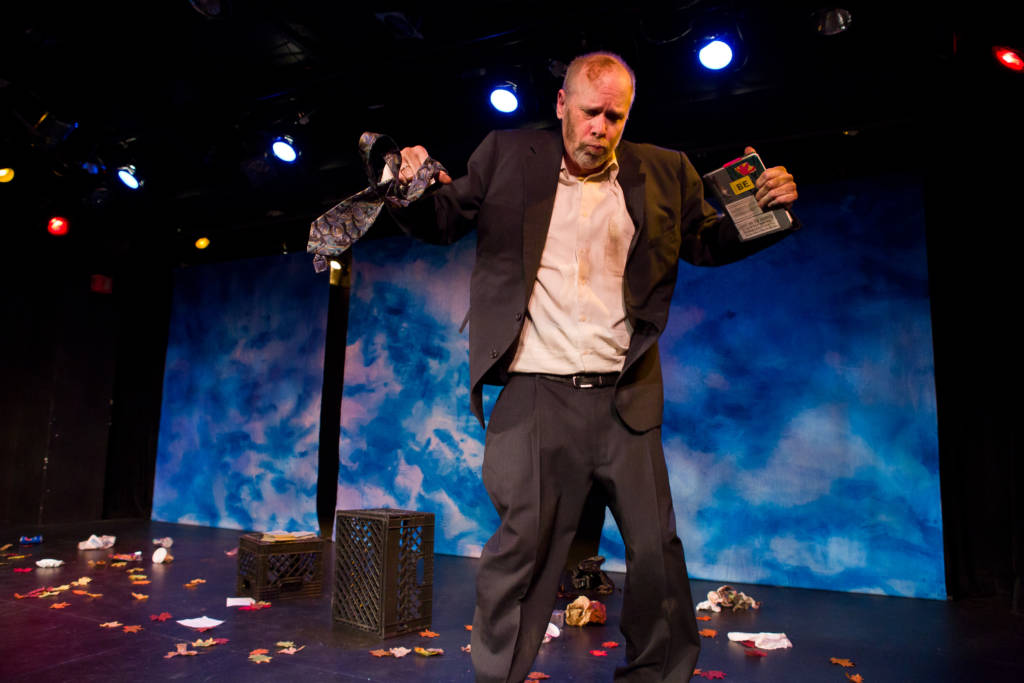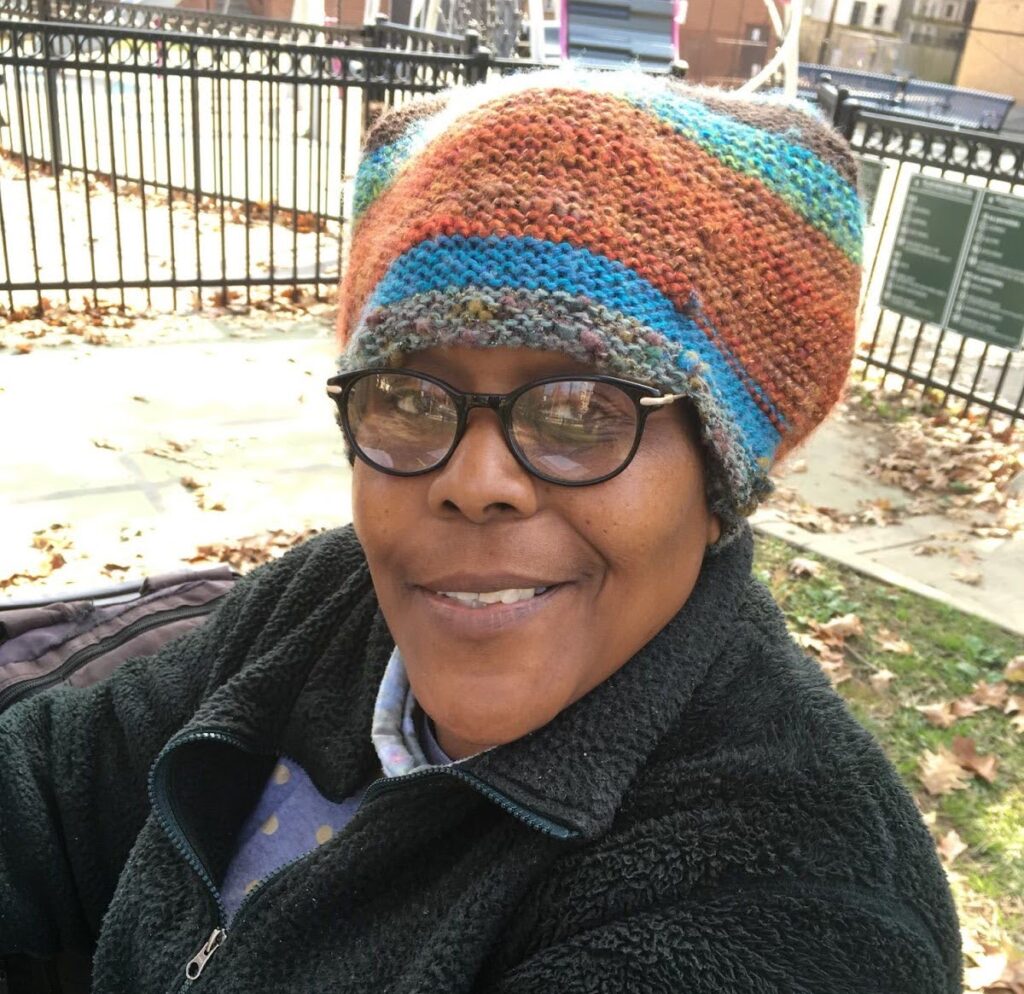Street Sense Artists/Vendors Michael Craig and Barbara Pollard interviewed actor and playwright Richard Hoehler on April 12. His off-Broadway production “I of the Storm” is coming to D.C. for one night only, May 4. Hoehler’s play follows the story of a man who finds himself living on the street yet discovering his true self for the first time. Craig and Pollard dive into Hoehler’s outlook on theater, homelessness and humanity.
Street Sense: Do you ever feel stage fright?
Richard Hoehler: Always. And I tell my students, always, if they’re not nervous then something is wrong. Because being nervous means you really care about what you’re doing. And the thing is, I’m terrified before I go on stage, but once I get out there, I’m perfectly fine.
You’re brave for doing this.
Hoehler: Pretty much I feel more comfortable on stage than I do in life. [laughs] It’s funny — being on stage just feels like being home to me. I’ve known since I was really young that this is what I was meant to do. I didn’t realize it was going to be so challenging. But, you know, things that are worth doing are worth the challenges.
How much negative attention did you get before you started getting professional?
Hoehler: It’s not so much that it’s negative. It’s just that it’s such a competitive business. And you know, rejection — you can go out to 20 auditions and maybe you’ll get one callback. So it’s not that people are negative as much as it’s just really very difficult because there’s so many people out there.
So, you do solos, one-man shows?
Hoehler: Yeah. I mean, I do all kinds of theater. But for the last 20 years I’ve been doing a series of solo shows. I’ve been doing theater my whole life. And I went to see a solo show, Eric Bogosian, and I was just so blown away by what he did that I said, “man, I want to do that.” I created my first solo piece, which went very well. Since then I’ve created three more.
Where do you do your work?
Hoehler: Wherever I can get a job. I primarily work off-Broadway and off-off-Broadway. What usually happens is I start my show out where I’ve started a lot of my shows out, at a place here called the Cornelia Street Café. The first time I worked there the guy saw my work and said he liked it and that whenever I’ve got something new to bring it there first. What happened with this show that I’m bringing down to D.C. is somebody saw it at Cornelia Street and really, really liked it and said, “I’d like to help you get this out into the world.”
Well, how do you go about creating a position like that for yourself?
Hoehler: So, what I tell anybody who asks me is that you just keep doing it. You have to be persistent. It’s a very tough business. And a lot of times, especially the stuff I write about.
Oh you do your own work?!
Hoehler: Yeah, yeah. This is all my own work. I use a pen name, R.J. Bartholomew. All of my solo work is original.
What do you write about?
Hoehler: I try to write about issues that I think are important in society. Not just feel-good stuff. I try to look at the truth and ask the difficult questions and make people think and make people feel and try to connect with each other. Sometimes that seems to be a little threatening to the powers that be.

I know, I write allegorically and metaphorically. I understand exactly what you’re saying. People can’t take the truth.
Hoehler: Right, it’s very, very frightening to them. I don’t understand why, but that also makes my work difficult sometimes. I’m lucky that I found the right producer for this show, who really loved the message and wanted to help get the word out. But I’ve hit a lot of roadblocks in the past where I would get so far and they would say “no-no, this is too risky” or “this is too edgy” or “this is too … something.” You know? I was writing about working people, I was writing about people who are struggling with homelessness, people that are struggling with living with addiction. And they just don’t want to —
— deal with it.
Hoehler: Right. And it’s like, we need to put light on these subjects or else they are never going to get solved.
What research went into making this character believable and respectful of homeless people?
Hoehler: I can only base it on my own life experience, which, I have never experienced homelessness. I have friends who have and I know people who through the years have. So I have some kind of reference. And I’ve also opened my shows to — even before this show, like, all my other shows — I’ve always invited people from homeless shelters and people that did not have opportunities to go to the theater and spent a lot of time dialoguing with them. That’s not as in-depth as I’d like it to be, but I trust as an artist that I’m able to access something. What I look at is the human condition and I think that regardless of if a person is homeless or has a home, that there’s a basic human condition there that we all share, regardless of what our challenges may be. And that’s what I try to focus on, so that people can identify with it regardless of their station in life.
Right, they are human and they are people. And you let them know that they are somebody.
Hoehler: Exactly. And they have something to say and they have something to contribute to life.
Yeah! You have a lot of beautiful people who just fell into bad situations.
Hoehler: I know, I know. I know.
Well, the way you accept your own challenges is wonderful and encouraging.
Hoehler: It’s not easy. But I can’t see any other way of being. And I hope both of you might come to the workshop I’m giving the next day. It’s an interactive workshop and I’d love to have both of you in that. I’ve worked for years with at-risk in New York City schools and for the last six years I’ve been working with Otisville State Prison teaching an acting class called “Acting Out.” The courses began to be developed for kids who have behavioral issues and things like that – and it’s developed into a professional acting class. It’s based a lot on my training but also on the needs of the group that I’m working with and it’s really about each person taking advantage of who they are and using themselves. I don’t believe acting is being somebody else, I believe acting is being who you are, perhaps in a different situation. And I think it’s fun work, it’s helpful, but it’s also very healing work. And the exercises that I use are basic warm-ups and then there’s a bit of improv and sensory work — all centered on person and catered to each individual. I started working with kids, but now I work with the incarcerated another adult groups from time to time. I’ve been getting more and more requests for this kind of work because it is different than most training that is provided. Theater training is mostly philosophy-based. This stuff is much more in tune with the human being that is working there and trying to find out who they are.
That’s so lovely.
And the wonderful thing about you doing that with inmates is that it brings out their talent.
Hoehler: It’s a very powerful program. We did a show there last summer and at one point they gave us permission to invite the families of the men. It was a very moving thing, where a lot of these children and mothers and wives and brothers were seeing the men doing something positive and powerful for the first time in their lives.
I’ve been in jail four times. Not fun. The thing about it is, what you’re basically doing, is liberating people.
Hoehler: Well it actually is that people liberate themselves, in a way.
True
Hoehler: I try to provide the space in which that can happen. I’m not anybody on my own. I’m just the teacher or the director or whatever. I just create a safe space in which people can really be themselves. I’m really excited about doing this event at Street Sense. I performed this show about a year and a half ago and the response was really strong.
What are your goals and dreams?
Hoehler: Boy, that’s a big question. [laughs] In my ripe old age (63), I’m still learning and hope to continue to learn right up till the end. I’m trying to break down the walls around me. I want to be able to see life for what it really, really, is and not for what people tell me or how they condition me or how society tells me. I’m really trying to be my own man.
A free performance of “I of the Storm” ($10 suggested donation) will be held at 6:30p.m. on May 4 in the Church of the Epiphany sanctuary, 1317 G Street NW (Metro Center). More details at http://streetsense.org/event/i-of-the-storm-washington-dc-homelessness







